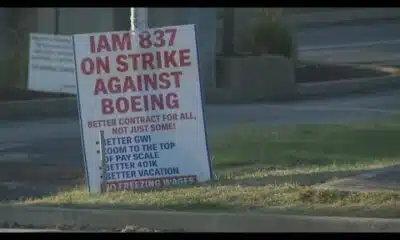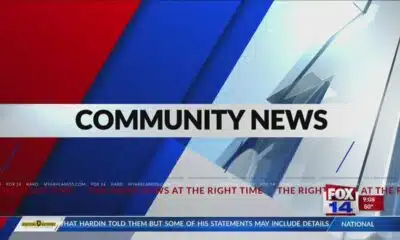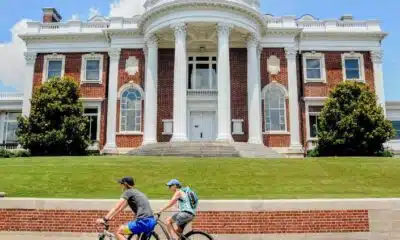News from the South - Alabama News Feed
Street-level violence prevention programs have been decimated by Trump just ahead of summer
by Amanda Hernández, Alabama Reflector
May 29, 2025
This story originally appeared on Stateline.
Community-based violence intervention programs nationwide have long worked alongside law enforcement officers to deescalate conflict, prevent retaliatory shootings and, in some cases, arrive at crime scenes before police do.
In many communities, these initiatives have been credited with saving lives and reducing violence.
But the Trump administration last month abruptly terminated at least 373 public safety grants from the U.S. Department of Justice’s Office of Justice Programs, pulling roughly $500 million in remaining funds across a range of programs, according to a new report by the Council on Criminal Justice, a nonprofit think tank. The cuts come just as summer is approaching — a season when violence consistently peaks.
GET THE MORNING HEADLINES.
The grants were initially valued at $820 million, but many were multiyear awards at different stages of rollout, which means some of the money has already been spent.
At least 554 organizations across 48 states are affected by the cuts, many of them small, community-based nonprofits that rely on this money. The rescinded grants supported everything from violence prevention and policing to victim advocacy, reentry services, research, and mental health and substance use treatment. Some of the grants also were cut from state and local government agencies.
Another new report from the Council on Criminal Justice dug deeper into local effects: It found that the Trump administration’s cuts also eliminated 473 minigrants — known as “subawards” — passed from primary recipients to smaller groups that often face challenges accessing federal dollars directly, such as rural government agencies and grassroots nonprofits.
About $5 million of those subawards was intended for state, local and tribal law enforcement agencies working to reduce violence in rural areas, according to the report.
Experts warn the timing couldn’t be worse. The summer months — historically linked to higher rates of violent crimes — are approaching, and the safety net in many cities is fraying. A growing body of research has found a correlation between spikes in temperature and violent crime, with studies suggesting that heat waves and sudden weather swings can inflame tensions and increase aggression.
“These programs are having to cut staff and cut services, and that will be felt in communities in states all over the country at exactly the time when they’re most needed,” said Amy Solomon, a senior fellow at the Council on Criminal Justice and the lead author of the report.
Solomon also previously served as assistant U.S. attorney general in the Biden administration, where she led the Office of Justice Programs — the Justice Department’s largest grantmaking agency.
Many of the primary grants that were terminated contained no references to race, gender or diversity-related language, according to the report — despite claims from federal officials that such criteria were driving the cuts. Primary grant recipients received their funding from the feds directly.
‘Wasteful grants’
U.S. Attorney General Pam Bondi defended the cuts in a late April post on X, stating that the department has cut “millions of dollars in wasteful grants.” She also signaled that additional cuts may be on the way. In her post, she specifically cited grants that supported LGBTQ+ liaison services in police departments and programs providing gender-affirming care and housing for incarcerated transgender people.
The Department of Justice’s cuts come amid a broader push by the Trump administration and the newly created Department of Government Efficiency to pull funding from a range of federal programs — a move they say is aimed at reducing spending and saving taxpayer dollars.
For some groups, the sudden withdrawal of funds has meant scaling back crime victim services or pulling out of some neighborhoods altogether.
Community violence prevention groups aim to stop shootings and other forms of violence before they happen by working directly with those most at risk. Staff — often with experience in the justice system — mediate conflicts, respond to crises, and connect people to support such as counseling or job training. In some cities, they’re dispatched to high-risk areas to deescalate tensions, often before police arrive.
And research shows that community-level violence prevention programs can contribute to drops in crime.
After a historic surge in homicides in 2020, violent crime in the United States dropped in 2024 to pre-pandemic levels — or even lower — in many cities. Preliminary 2025 data suggests that the downward trend is continuing in major cities, including Baltimore, Houston, Los Angeles and Washington, D.C.
But the progress hasn’t reached every community. Some neighborhoods are still grappling with high rates of gun violence and car theft.
Organizations that faced the toughest financial cuts had been funded through the U.S. Department of Justice’s Community Based Violence Intervention and Prevention Initiative — the federal government’s primary mechanism for supporting this work.
Since the program’s launch in 2022, the federal Office of Justice Programs has invested about $300 million in community violence intervention efforts and related research. But nearly half of that funding has now been wiped out, according to the Council on Criminal Justice report.
“It’s really unprecedented to see these kinds of grants cut midstream,” Solomon told Stateline. “This was an effort that had bipartisan support [in Congress] and in the field all across the country.”
Impact on communities nationwide
In late April, Aqeela Sherrills received a letter from the federal Justice Department terminating a $3.5 million grant that supported the Community-Based Public Safety Collective. Sherrills is the co-founder and executive director of the national organization, which focuses on community-led approaches to preventing violence, including mediating conflicts, building relationships in high-risk neighborhoods and connecting people to resources such as housing, mental health care and job training.
The letter said the organization’s efforts no longer aligned with the federal Justice Department’s priorities, which include supporting “certain law enforcement operations, combatting violent crime, protecting American children, and supporting American victims of trafficking and sexual assault.”
Until the end of April, the collective had an agreement with the Justice Department to provide training and technical assistance to 95 local groups — including community groups, police departments, city and county governments, and state agencies — that had each been awarded $2 million over three years to run community violence intervention programs.
We’re bracing for what could potentially be a high-violence summer.
– Aqeela Sherrills, co-founder and CEO of the Community-Based Public Safety Collective
But after the department cut $3.5 million, the Community-Based Public Safety Collective was forced to lay off 20 staff members.
“Without the significant funding … it destabilizes the organizations. People’s ability to be able to provide for themselves and their family is at risk,” Sherrills said in an interview. “We’re bracing for what could potentially be a high-violence summer.”
The deepest funding cuts hit states led by both Republican and Democratic governors, including California, Florida, Illinois, Kentucky, Massachusetts, New Jersey, New York, North Carolina, Virginia and Washington.
About $145 million in violence intervention funding was rescinded overall, along with an additional $8.6 million for related research and evaluation efforts, according to the Council on Criminal Justice report.
Some of the canceled grants funded studies and research on forensics, policing, corrections issues and behavioral health. Now, those projects may be left unfinished.
Some of the largest losses hit intermediary organizations, such as the Community-Based Public Safety Collective, that support smaller programs by providing microgrants, training and technical assistance.
For organizations such as the Newark Community Street Team in New Jersey, the loss of federal funding has left some areas of the city without coverage.
The funding had allowed staff to monitor neighborhoods and engage directly with community members to prevent violence. That included weekly community walks, where team members connected with victims of crime and people who may have witnessed violence, linking them to resources such as counseling or legal aid. The team also operates a hotline where residents can report crimes or alert staff to tensions that might escalate — allowing the team to step in before violence occurred.
Some of the lost funding also supported school-based initiatives, where mediators helped students resolve conflicts before they escalated into fights or other forms of violence.
Of the 15 Newark positions affected by the cuts, four employees were reassigned to other departments; the others were let go. Some of the team’s staff members are formerly incarcerated, a vital trait that helps them connect with residents and build trust in communities that are often wary of traditional law enforcement.
“We just have to continue working and serving our community the best we can,” said Rey Chavis, the executive director of the street team.
That work appears to be contributing to a decrease in the community’s crime rates.
City crime data from Jan. 1 to April 30, 2025, shows a significant drop in violent crime in Newark compared with the same period in 2024. The total number of violent crimes reported to police fell by 49%, driven largely by a 68% decrease in robberies, according to Stateline’s analysis of the data. Homicides dropped by 53%, while aggravated assaults declined by 43%. Rapes dropped slightly by 3%.
Stateline reporter Amanda Hernández can be reached at ahernandez@stateline.org.
Stateline is part of States Newsroom, a nonprofit news network supported by grants and a coalition of donors as a 501c(3) public charity. Stateline maintains editorial independence. Contact Editor Scott S. Greenberger for questions: info@stateline.org.
YOU MAKE OUR WORK POSSIBLE.
Alabama Reflector is part of States Newsroom, a nonprofit news network supported by grants and a coalition of donors as a 501c(3) public charity. Alabama Reflector maintains editorial independence. Contact Editor Brian Lyman for questions: info@alabamareflector.com.
The post Street-level violence prevention programs have been decimated by Trump just ahead of summer appeared first on alabamareflector.com
Note: The following A.I. based commentary is not part of the original article, reproduced above, but is offered in the hopes that it will promote greater media literacy and critical thinking, by making any potential bias more visible to the reader –Staff Editor.
Political Bias Rating: Center-Left
This article presents a critical view of the Trump administration’s decision to cut funding for community-based violence prevention programs, emphasizing the negative impact on vulnerable communities and nonprofits reliant on federal grants. The tone highlights concerns about reduced public safety resources and features commentary from experts affiliated with the Biden administration, which suggests a moderate progressive perspective. However, it maintains a largely factual and data-driven approach, referencing bipartisan support for the programs and the broad geographic impact of the cuts. The framing leans slightly left due to the focus on social programs, community welfare, and criticism of conservative policy choices.
News from the South - Alabama News Feed
Zaxby's Player of the Week: Dylan Jackson, Vigor WR
SUMMARY: Dylan Jackson, senior wide receiver for the Vigor Wolves, was named Zaxby’s Player of the Week after leading his team to a dominant region win with over 200 yards and two touchdowns. The Wolves, ranked number one in 5A, emphasize getting the ball to their best players, a strategy credited to Coach Mick S. Jackson’s ability to read defenses and execute plays with quarterback Sammy has been crucial. The team’s hard offseason training, especially in passing, is paying off. Their goals remain to beat Blunt, win the region, and compete for the state championship, treating each game like a playoff.
Zaxby’s Player of the Week: Dylan Jackson, Vigor WR
News from the South - Alabama News Feed
Alabama lawmaker revives bill to allow chaplains in public schools
by Andrea Tinker, Alabama Reflector
September 9, 2025
An Alabama representative is pushing for chaplains to be allowed in public school.
Rep. Mark Gidley, R-Hokes Bluff, prefiled HB 8 for the 2026 legislative session, which starts in January. It would allow school boards to decide whether to allow campus chaplains and teachers in public school.
Gidley has filed similar legislation in the past. The most recent version cleared the House with a vote of 91 to 4 in April but did not make it to the Senate Education Policy Committee. He said in an interview Monday that getting the bill in earlier will give it a better chance to pass.
“We were a little bit late getting it on the floor this past year. It didn’t fail in the Senate because of any problems, it just ran out of time. So I think getting it in earlier is going to help us to be able to work it through both chambers this year,” he said.
Gidley’s goal for the chaplains is that they go to the schools as needed to provide services and support for the faculty and staff in schools. He said this could help teachers in rural counties who lack resources for mental health services.
“It could be a resource they could tap into when they may not be able to tap into other resources that could offer support,” Gidley said.
Critics of the legislation said the measure would violate the separation of church and state in schools.
Each local board of education would vote on whether to approve volunteer chaplains for schools under the measure. If approved by the board, volunteers would have to complete a “recognized chaplain training program” and a background check.
The legislation specifies that schools cannot accept a volunteer who’s been “adjudicated or convicted of an offense that requires registration as a sex offender.”
Sen. Rodger Smitherman, D-Birmingham, backed a similar bill last year. SB294 was passed by the Senate, but it failed to get House approval.
He said in a phone interview Thursday that chaplains are needed in schools.
“We have many situations in our schools that require a need for counseling and for support — not only for students, but for staff and teachers as well,” he said.
Chaplains would provide “support, services and programs” as requested by teachers under the measure. But Smitherman said these types of motions are not meant to replace guidance counselors.
“Some of these situations need additional assistance in the areas that those chaplains can provide,” Smitherman said. “And the guidance counselor is not for the teachers and the staff workers, so this will make it available to them as well.”
Gidley said guidance counselors and chaplains serve different functions within the school.
“They’re not even in the same category and so it’s totally absurd to even think that one would replace the other,” he said. “These chaplains are strictly there for moral, and if need be, spiritual guidance. Whatever the situation is, if somebody needs a confidential nonpartisan place to share something they could be dealing with, I think that could be extremely helpful with our teachers and administrators in the school system.”
The Alabama Legislature will begin meeting Jan. 13.
Alabama Reflector is part of States Newsroom, a nonprofit news network supported by grants and a coalition of donors as a 501c(3) public charity. Alabama Reflector maintains editorial independence. Contact Editor Brian Lyman for questions: info@alabamareflector.com.
The post Alabama lawmaker revives bill to allow chaplains in public schools appeared first on alabamareflector.com
Note: The following A.I. based commentary is not part of the original article, reproduced above, but is offered in the hopes that it will promote greater media literacy and critical thinking, by making any potential bias more visible to the reader –Staff Editor.
Political Bias Rating: Center-Right
This content reflects a center-right political bias primarily through its focus on legislative efforts led by a Republican lawmaker advocating for chaplains in public schools, an initiative often associated with conservative values emphasizing religion in public life. The article presents the bill and its supporters in a factual and balanced manner, including some perspectives of critics concerned about church-state separation, which tempers any overt partisan slant. The respect shown for religious support roles aligned with traditional moral guidance aligns with center-right priorities, while the inclusion of bipartisan mentions adds a moderate tone overall.
News from the South - Alabama News Feed
Judge to decide on evidence, video in Jabari Peoples' death by Friday
SUMMARY: A judge is expected to decide by Friday whether to review police body cam footage related to Jabari Peoples’ death. Peoples was fatally shot by a Homewood officer in June, with the death ruled justified. The family has seen portions of the video but not the full footage or a copy. Peoples’ mother’s legal team requested preservation of all evidence for potential wrongful death litigation. Concerns were raised about discrepancies between what the district attorney and the family observed in the video. Black Lives Matter protesters supported the family’s demand for transparency. The judge requested the investigating agency to submit all related videos for review.
Judge to decide on evidence, video in Jabari Peoples’ death by Friday
Subscribe to WVTM on YouTube now for more: https://bit.ly/2jvAaUD
Get more Birmingham news: http://www.wvtm13.com
Like us: https://www.facebook.com/WVTM13/
Follow us: https://twitter.com/WVTM13
Instagram: https://www.instagram.com/wvtm13/
-
News from the South - Texas News Feed6 days ago
Texas high school football scores for Thursday, Sept. 4
-
News from the South - Louisiana News Feed6 days ago
Portion of Gentilly Ridge Apartments residents return home, others remain displaced
-
News from the South - North Carolina News Feed6 days ago
Hanig will vie for 1st Congressional District seat of Davis | North Carolina
-
News from the South - Alabama News Feed6 days ago
Alabama state employee insurance board to seek more funding, benefit changes
-
News from the South - West Virginia News Feed6 days ago
WV Supreme Court will hear BOE’s appeal in vaccine lawsuit — but not right away
-
News from the South - Virginia News Feed6 days ago
Norfolk port project funding to be withdrawn amid federal cuts to offshore wind projects
-
Our Mississippi Home7 days ago
The Hummingbirds’ Last Hooray of Summer
-
News from the South - Georgia News Feed6 days ago
More details expected on ICE raid at south Georgia plant | Georgia










































